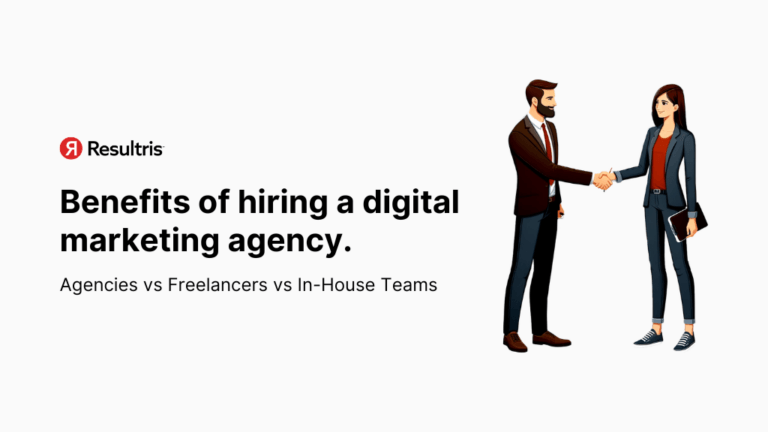

Written by: Tim Eisenhauer
Last updated:

Navigating the digital marketing landscape requires strategic decisions, particularly when it comes to the choice between hiring a digital marketing agency, using freelancers, or relying on in-house teams.
At Resultris, we’ve done it all. We’ve significantly scaled companies as part of in-house teams—growing companies from the ground up, we’ve taken various freelance projects over the years, and now we’re doing the agency thing with our content marketing subscriptions. When working as part of in-house teams, we’ve also hired many freelancers and agencies to help with various marketing projects. So we’ve got a ton of knowledge and experience with these methods of digital marketing to give you an inside look at what works and what doesn’t.
Let’s dive into the advantages of each option, with a focus on the benefits of hiring a digital marketing agency.
Each of these aspects plays a crucial role in determining the most effective approach for a business’s digital marketing needs.
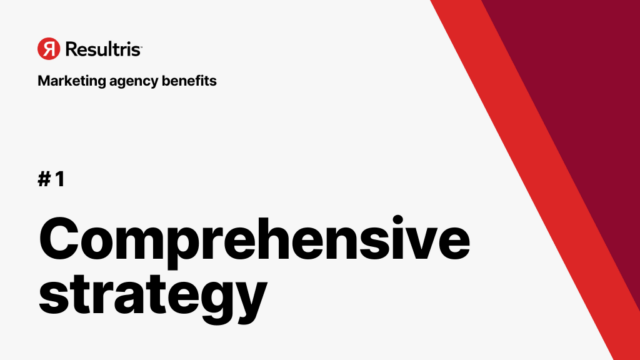
A digital marketing agency offers an all-encompassing strategy that integrates various aspects of digital marketing into a cohesive plan. This approach ensures that SEO, content marketing, social media, and other digital strategies work in unison, amplifying each other’s effectiveness and aligning with the company’s overarching goals.
Freelancers often excel in specific areas but may lack a broad perspective on overall marketing strategy. While they can be effective for targeted tasks, their isolated efforts may not always align seamlessly with other marketing components, potentially leading to disjointed strategies.
In-house teams have the advantage of deep company knowledge and direct alignment with the company’s culture and goals. However, they may lack the comprehensive skill set and resources that an agency offers, limiting the scope and effectiveness of their marketing strategies.
Let Resultris help! Our expert team can simplify the process and guide your path to effective content marketing.
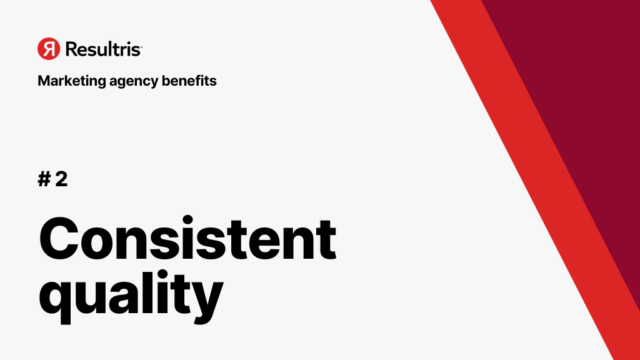
Digital marketing agencies, like Resultris, are committed to maintaining a high standard of quality in every aspect of their work. This commitment to excellence ensures that all marketing efforts reflect well on the brand, enhancing the company’s reputation and effectiveness in the market.
While some freelancers produce outstanding work, the quality can vary significantly. The lack of a centralized quality control system can lead to inconsistencies, affecting the overall impact of the marketing efforts.
The quality of work produced by in-house teams often depends on the resources available to them, including expertise, tools, and time. While they can provide consistent brand messaging, their output may lack the innovative edge and comprehensive approach of a specialized agency. The work created by in-house teams has a tendency to get stale and lackluster over time, mainly due to burnout and boredom of doing the same things for the same company over and over again.
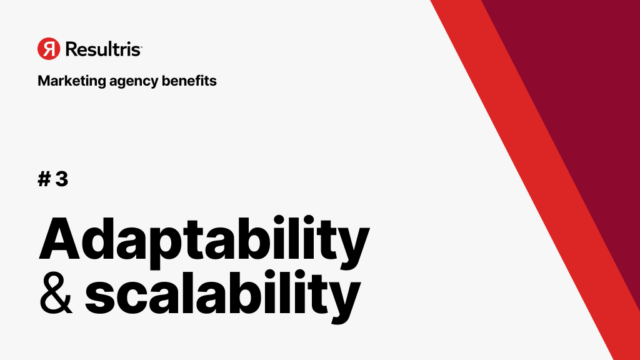
Digital marketing agencies stand out for their agility and ability to scale strategies in response to market changes and business growth. Their broad expertise and resources allow for quick adaptation and expansion of marketing efforts as needed.
Freelancers may excel in adaptability within their area of expertise but often struggle with scalability due to limited resources and bandwidth. Rapid changes in strategy or scaling up operations can be challenging for individual freelancers to manage effectively.
While in-house teams can adapt to company changes, they may be constrained by limited resources, budget, and skill sets. Scaling up marketing efforts often requires additional hiring or training, which can be time-consuming and costly.
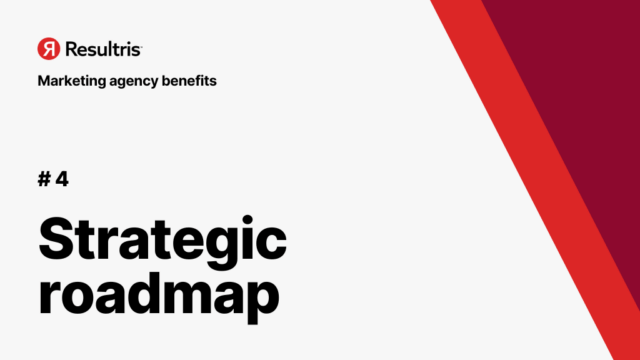
Digital marketing agencies excel in providing a structured, long-term strategic roadmap for their clients. This roadmap encompasses a comprehensive plan covering various aspects of digital marketing, ensuring all efforts are goal-oriented and cohesive. The forward-thinking approach of agencies allows for anticipating market trends and adjusting strategies proactively.
Freelancers typically operate with a project-based focus, handling specific tasks or short-term objectives. While this can be effective for immediate needs, it often lacks the continuity and long-term planning essential for sustained digital marketing success.
In-house teams might excel in aligning marketing efforts with the company’s immediate goals but may struggle with broader, long-term strategic planning. Balancing day-to-day operations, not to mention day-to-day company politics, with the development of a long-term marketing strategy can be challenging, often requiring additional external insights or resources.

Content marketing subscriptions to grow your business.
Need help creating content for your digital marketing? Resultris can help you. Over 15 years experience.

One of the significant benefits of hiring a digital marketing agency is the access to a diverse pool of talent. Agencies bring together experts in various fields of digital marketing, for example: SaaS content marketing, providing a comprehensive skill set that can tackle any aspect of digital marketing with proficiency and creativity.
Freelancers often specialize in particular areas of digital marketing, offering depth in specific skills. While this expertise is valuable, relying solely on freelancers can lead to gaps in the overall marketing strategy, where certain skills or perspectives are lacking. Additionally, if you’re hiring multiple freelancers to work on multiple projects, you have to consider the extra time it takes to manage them, taking your marketing leader away from other marketing plans, strategies, and implementations.
In-house teams may possess a good mix of skills but are often limited by the scope and scale of their expertise. Expanding their skill set usually requires hiring additional staff or outsourcing, which can be a logistical and financial challenge.
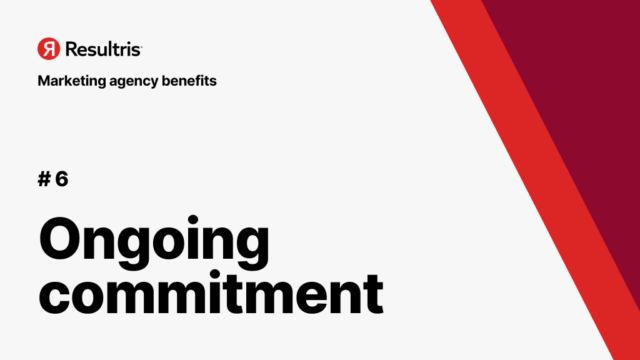
A key advantage of working with a digital marketing agency is their commitment to long-term client success. Agencies invest in understanding their client’s business and evolving alongside them, ensuring that marketing strategies remain effective and relevant over time.
Freelancers generally focus on specific tasks or short-term projects. While they can offer high-quality work for particular needs, they may not always be available for ongoing or future projects, lacking the continuity necessary for long-term marketing success.
In-house teams offer continuity but are often subject to internal dynamics, including changes in company direction, staff turnover, or budget restraints, among many others. These factors can impact the consistency and longevity of marketing strategies.
During our time leading an in-house team, there was a very specific moment that had a major, negative impact to our digital marketing efforts (and ultimately sales) due to a newly hired sales “leader”. As a sales leader, it was this person’s responsibility to “lead” the sales team and close more deals… you would think.
Our inbound marketing engine was running, brining in $4M-$5M sales qualified leads every quarter, however, the sales team was unable to achieve their goal. They needed help closing deals. Everything else was fine, from discovery calls through demos, and follow-ups in between. Deals would approach the finish line, stall out, and die. Closing deals was the issue.
So instead of helping the team close deals and teaching them how to close deals (which by the way, should have been his speciality, considering he was the old blowhard, windbag type), this new sales leader, let’s call him “Bruce”, had other plans. He thought it best to change many of the initial marketing-to-sales processes—some of which really had nothing to do with sales at all.
For instance, he wanted to change the language on our contact page and calls-to-action, making it less impactful and far less appealing for prospects to want to engage with us and click the button.
Example 1: Our CTA was “Schedule a demo”. He wanted this changed to “Schedule a discovery call”. Keep in mind, we were selling software. Most people, when in the market to buy a software product, want to see the product in action… they want to see a demo. They don’t want to waste half an hour on a call with someone and not even see the product they’re interested in buying. So why would we tell the prospect we have a gatekeeper preventing them from seeing the software on their scheduled call?
Changing a CTA from “schedule a demo” to “schedule a discovery call” is going to prevent the prospect from filling out the form and clicking the button. How do we know this? Because the prospects can simply “schedule a demo” immediately with one of the many competitors.
Example 2: Bruce wanted to add more fields to our contact form, asking for the prospects’ city, state, and zip code of their company headquarters—creating an arduous task for anyone to fill out our contact form. His intention was to split the sales manager’s leads by regions, in an effort to “keep things fair”.
Was all of this some sort of sabotage on the marketing team to have less leads come in and make us look bad? It sure seemed that way. However, it was more likely due to Bruce’s incompetence and inability assess the issue, adapt, and create the appropriate solution. As the old saying goes, “If it ain’t broke, don’t fix it.” It wasn’t marketing that needed fixing—the sales team needed help closing deals.

Bruce also decided to hire 4 more sales reps with little to no experience, gave them very large and very well known brand leads (many $100K+ deals… with one being one of the largest food and beverage companies in the world—a potential $500K-$1M deal) because of this new region-based sales process, in addition to having them try to develop an outbound process.
Of course, the new hires weren’t able to close any of the deals that we (the marketing team) were handing to them on a silver platter… they had no clue what they were doing because they were brand new, had no experience, and had no training or leadership from Bruce. And of course they didn’t know how to develop their own outbound process (same reasons as just mentioned), but even so, they didn’t have to or need to at this time.
There were already $4M-$5M of inbound SQLs coming in every quarter that they couldn’t close. The hottest leads you could think of, knocking on their doors, saying, “Hello, we’re interested in your product, let’s talk! We’d like to see a demo. Show us how it works!” But instead, Bruce wanted the team’s focus shifted on an outbound process, essentially ignoring the hot leads coming in. Or better yet, let’s not even show our hot leads a demo after they fill out our form, but instead, let’s waste their time with discovery calls, asking irrelevant questions from brand new sales reps who can barely form coherent sentences when speaking. This sounds like a winning strategy for sure.
As a marketing team that helped develop the initial sales processes from the beginning of the company’s existence, we questioned and questioned everything, every step of the way, but we were consistently told to follow Bruce’s direction. And the examples I’ve provided are only a few of of Bruce’s gems of ideas. “He’s got the experience and knows what he’s doing” is what we were told by the (new) powers that be. But the numbers told a different story. During this time, the marketing numbers stayed consistent, while the sales numbers dropped significantly—sales were probably the lowest they’d ever been.
Ultimately, these changes created a giant mess within our sales department and our CRM, not to mention our SaaS marketing initiatives. It took our entire marketing team off of anything and everything marketing, to help the sales team implement and adjust everything Bruce wanted. This lasted about 6 months to a year, when finally Bruce and his new hires were fired. And at this point, it was again on the marketing team to help turn back the clock, so to speak, and get things “back to normal”.
So about a year’s worth of digital marketing (and also sales) initiatives were completely stifled and wasted due to one new hire that was given the authority to change the direction of 2 departments he had no business giving direction to. And the new leadership team (that’s a whole other story of incompetence) followed blindly as we all watched the company burn money on new hires, lose money through lack of sales, miss out on new marketing and sales opportunities, and waste a hell of a lot of time.
Lessons of the story:
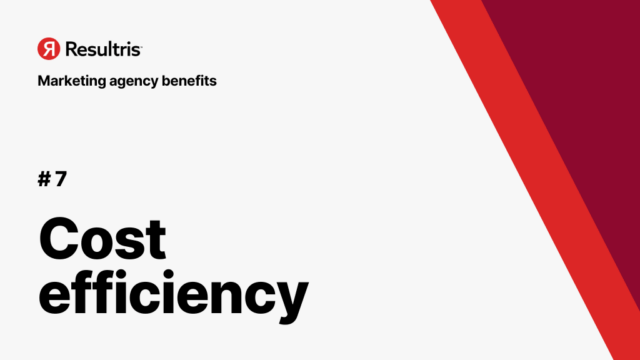
While the upfront costs of hiring a digital marketing agency may appear higher than other options, the return on investment (ROI) is often significantly greater. Agencies provide a comprehensive suite of services, from strategy development to execution and analysis, which ensures that every dollar spent contributes to a cohesive and effective marketing effort. This approach minimizes wasted spend and maximizes the impact of the marketing budget.
Freelancers often offer lower upfront costs, making them an attractive option for specific, short-term projects. However, when relying solely on freelancers for ongoing or comprehensive marketing needs, the costs can accumulate, especially when coordinating multiple freelancers across different aspects of marketing. Additionally, the potential for inconsistent quality and the time spent managing various freelancers can result in hidden costs.
Freelancers are often paid by the hour, and while some of them may have lower rates, you’re typically going to get what you pay for. First, they’ll say it took them more hours to make up for the lack of a higher rate. Then there’s a chance they’ll give you subpar work that you’ll have to go back and ask for revisions, adding more hours to the bill. Sure, they’ll make those changes, and things will be slightly better. But are you going to keep going back to them and pay for minor adjustments? Are you going to have a different freelancer make the adjustments at a (likely) higher rate? Or are you just going to fix it yourself at this point, just to get it done how you want it, taking away time you were planning to spend on other initiatives?
When we led an in-house team, we spent hundreds and thousands of dollars on various freelancers to write our blog posts for us, among other pages, and ultimately we had to change, edit, and optimize just about everything they did. More often than not, they would lack quality and “stuff” the posts with unnecessary words and phrases, using trite language and cliches, not suited for our target audience and not relaying our value props, all to get more words in the post (since we paid by the word back then).
Depending on the task, freelancers can be a quick and relatively cheap way to get some things done, but when it comes to your content, digital marketing, and brand, you’ll want dedicated people that have the experience in all of these different areas, and that have a proven track record, rather than a bunch of random freelancers trying to piece things together. Going that route, you’ll end up with a Frankenstein brand and marketing.

Maintaining an in-house digital marketing team involves not just salaries but also costs related to training, benefits, health insurance, 401(k)s, technology, and other resources. While having a dedicated team offers control and alignment with the company’s culture, it can be a significant ongoing investment, especially for small to medium-sized businesses. Moreover, the inability to scale quickly or adapt to new trends without additional hiring or training can limit the overall cost efficiency.
Let’s look at some general numbers. And of course, these can vary. Figure you’re paying your CMO $250K/year, your VP of Marketing $200K/year, your Director of Marketing $150K/year, your Marketing Manager $100K/year, not to mention any additional marketing “specialists”, software they need, and potential freelancers you’re hiring throughout the year to do odd jobs. Your annual marketing spend, on employees alone, is approaching $1M.
And do you even know what these employees are doing day to day? Probably not. They’re likely doing as little work as possible, scheduling pointless meetings with each other to talk about anything but work, ultimately wasting time, but filling up their calendars to “look” busy, and collect a paycheck.
And sure, they’ll get a few of the predefined checklist items completed for the month… the items that were discussed a month prior, or at the beginning of the quarter. But of course, they’re going to push things off to the next month (because something “unexpected” happened or “this department” needed our help with something) so they have additional tasks to complete the following month, and the cycle continues.
With Resultris, even our most in-depth and involved plan (our Enterprise Plan) is only a fraction of that cost, and you’ll know exactly what you’re getting every month. And you’re going to get far more bang for your buck. Digital marketing agencies, like us, are hired to produce results and maintain effective and consistent output. We’re not hired to waste time and run out the clock each week.
In the digital marketing domain, the choice between an agency, freelancers, and in-house teams depends on various factors, including the company’s size, budget, and long-term goals. However, the benefits of hiring a digital marketing agency, like Resultris, are evident in our ability to provide comprehensive, high-quality, adaptable, and strategically focused marketing solutions. Agencies offer a blend of diverse skills, long-term commitment, and strategic foresight, making them an ideal partner for businesses looking to thrive in the digital landscape.




